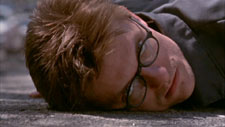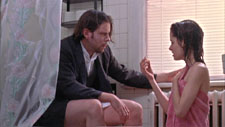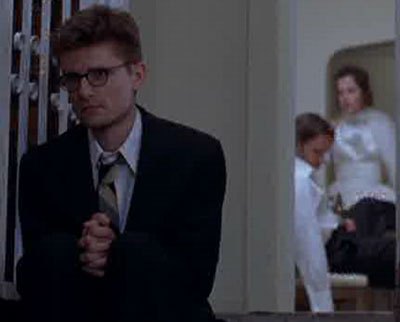| Reviews & Columns |
|
Reviews DVD TV on DVD Blu-ray 4K UHD International DVDs In Theaters Reviews by Studio Video Games Features Collector Series DVDs Easter Egg Database Interviews DVD Talk Radio Feature Articles Columns Anime Talk DVD Savant Horror DVDs The M.O.D. Squad Art House HD Talk Silent DVD
|
DVD Talk Forum |
|
|
| Resources |
|
DVD Price Search Customer Service #'s RCE Info Links |
|
Columns
|
|
|
Henry Fool
Columbia/Tri-Star // R // December 16, 2003
List Price: $24.96 [Buy now and save at Amazon]
 Hal Hartley's Henry Fool stars Thomas Jay Ryan (The Legend of Bagger Vance) as the title character, a man who's as pretentious as he is mysterious, constantly spouting off flowery, ornate language to further represent himself as the intellectual he claims to be. His life's work is a confession, a self-proclaimed literary masterpiece that cannot be read or even described until the final touches have been lavished upon it. Henry is a recent boarder in a basement apartment below the home of Simon Grim (James Urbaniak), an expressionless, silent garbageman. Simon shares the house with Fay (Parker Posey), his promiscuous loaf of a sister, and his sullen, near-immobile mother (Maria Porter). After rambling about an eye-gouging threat in a faraway land, Henry encourages Simon to write down his thoughts in a journal, and what emerges when Simon puts pen to paper greatly impresses him. Simon's poetry is unpolished but shows great promise, and Henry encourages Simon to pursue his gift. Henry is determined to bring Simon's work in front of as many eyes as he can, and the reception greatly varies. To some, it's a bold masterpiece. Others revile it as pornography. In either case, the epic poem and its author are never ignored, inspiring a passionate response from all who encounter it, be it inspiring a mute girl to sing or being splashed with a pot of boiling water. Henry Fool follows the power of Simon's poetry, the celebrity it brings him, and the effect it has on the lives of those around him.
Hal Hartley's Henry Fool stars Thomas Jay Ryan (The Legend of Bagger Vance) as the title character, a man who's as pretentious as he is mysterious, constantly spouting off flowery, ornate language to further represent himself as the intellectual he claims to be. His life's work is a confession, a self-proclaimed literary masterpiece that cannot be read or even described until the final touches have been lavished upon it. Henry is a recent boarder in a basement apartment below the home of Simon Grim (James Urbaniak), an expressionless, silent garbageman. Simon shares the house with Fay (Parker Posey), his promiscuous loaf of a sister, and his sullen, near-immobile mother (Maria Porter). After rambling about an eye-gouging threat in a faraway land, Henry encourages Simon to write down his thoughts in a journal, and what emerges when Simon puts pen to paper greatly impresses him. Simon's poetry is unpolished but shows great promise, and Henry encourages Simon to pursue his gift. Henry is determined to bring Simon's work in front of as many eyes as he can, and the reception greatly varies. To some, it's a bold masterpiece. Others revile it as pornography. In either case, the epic poem and its author are never ignored, inspiring a passionate response from all who encounter it, be it inspiring a mute girl to sing or being splashed with a pot of boiling water. Henry Fool follows the power of Simon's poetry, the celebrity it brings him, and the effect it has on the lives of those around him. Henry Fool is a strange movie in a lot of ways, but it's a surprisingly accessible brand of weirdness. Even the structure is unconventional, eschewing the standard "introduce characters, introduce conflict, resolve conflict" formula. Less about its destination than the journey, the ambiguity of Henry Fool's open ending is certain to inspire lengthy discussion among viewers. It's a lengthy film, approaching two hours and fifteen minutes, but it's paced exceptionally well. Even for someone with as astonishingly short an attention span as myself, the movie didn't drag or feel at all repetitive. Henry Fool deftly intermingles comedy and drama, though the material is rarely overtly comedic, with its laughs often stemming from the absurdity of some of its situations. In one scene, Simon takes Henry's advice and attempts to best experience some of the young, female patrons of a library, and the awkward encounters that ensue in the space of that few minutes had me laughing more frequently than the entirety of most movies that have the 'Comedy' label plastered on their poster art. There's some toilet humor -- literally, in one memorable case -- but it's so bizarre, unexpected, and over-the-top that it trumps weaker attempts in many recent comedies. Henry Fool boasts some rather dark portions, but the mix of moments both strange and amusing keep it from becoming excessively dreary. The movie is rated R due in part to its strong sexuality, though its sex scenes are not painted with a softly-lit, erotic brush, but as an entirely unattractive, almost primal act that's rarely captured on film. I found it equally fascinating that although Simon's poem is in some way responsible for the majority of the activity that occurs in the film, it's not quoted or even clearly glimpsed on-screen to any notable extent. The responses to his work on both ends of the spectrum are so impassioned that an extended sample would have been entirely unnecessary; the poem is a means to an end for the storytelling, and its precise contents are entirely irrelevant.
There are numerous themes touched upon in Henry Fool -- the relationship between instructor and pupil, the cult of celebrity, loyalty, and the creation of art, to rattle off a handful -- but change is the one I found most interesting. Although its characters are altered to varying degrees as the film progresses, the core of who they are remains intact, often to their detriment. One of the more blatant examples of this, simultaneously sneaking in a jab at political hypocrisy, is seen in Warren (Kevin Corrigan). He's introduced screwing a teenage girl outside a decrepit building while puffing on a crack pipe, later attempting to humiliate a voyeuristic Simon in a doughnut shop, lobbing glass bottles at his home, and mercilessly beating him. After enduring the spiel of an activist who's promoting the election of a radical politician, Warren attempts to make some surface changes. He tries his best to repeatedly fumble through a canned speak to encourage potential voters, but the suit he uncomfortably wears can't conceal his xenophobia. When his extremist candidate predictably flounders in the polls, Warren's minimal attempts at bettering himself are instantly wiped away, exposing the unbelievably cruel and abusive man beneath. Fay is initially a self-centered woman with an insatiable sexual appetite and a delusion that she's irresistable. Once determined to avoid anything bearing so much as a passing resemblance to employment, she progressively becomes computer savvy and finds herself with a variety of modest career options. Simon begins the movie as a quiet, stammering garbage man and is virtually unrecognizable when he reappears in the final moments of the film. His metamorphosis is gradual, becoming increasingly confident as the readership of his opus is built. Henry and Simon undergo a sort of role reversal: Simon becomes what Henry has long aspired to be, and Henry takes Simon's discarded past and assumes his once-unremarkable lot in life.
 The central cast is uniformly excellent throughout. Thomas Jay Ryan makes his feature film debut as the title character, and although my initial impression was that his performance was unconvincingly, it took little time to come to the realization that this was rather the point. Ryan's is almost a multigeneration performance, playing a character who himself is acting. Simon too required slowly dipping my toes into the pool before becoming accustomed to the water, but once those early moments pass, the talent on display becomes apparent. Henry by all rights shouldn't be the least bit appealing -- aside from the fact that he's constantly putting on airs, there's an appalling transgression in his past coupled with the shoddy way he treats his young son and wife. Another stand-out is Christy Romano, an actress I typically associate with very entertaining but comparatively lightweight TV series on the Disney Channel. Her role in Henry Fool is brief but pivotal, and although I'd certainly consider myself to be a fan of such series of hers as Even Stevens, I'm left wondering why she hasn't taken on more dramatic roles like that of Pearl.
The central cast is uniformly excellent throughout. Thomas Jay Ryan makes his feature film debut as the title character, and although my initial impression was that his performance was unconvincingly, it took little time to come to the realization that this was rather the point. Ryan's is almost a multigeneration performance, playing a character who himself is acting. Simon too required slowly dipping my toes into the pool before becoming accustomed to the water, but once those early moments pass, the talent on display becomes apparent. Henry by all rights shouldn't be the least bit appealing -- aside from the fact that he's constantly putting on airs, there's an appalling transgression in his past coupled with the shoddy way he treats his young son and wife. Another stand-out is Christy Romano, an actress I typically associate with very entertaining but comparatively lightweight TV series on the Disney Channel. Her role in Henry Fool is brief but pivotal, and although I'd certainly consider myself to be a fan of such series of hers as Even Stevens, I'm left wondering why she hasn't taken on more dramatic roles like that of Pearl. Henry Fool has received a delayed release on DVD, one of those rare films to be distributed theatrically after the format's inception without quickly seeing a subsequent release on a shiny five-inch platter. Unfortunately, little was done to make Henry Fool worth the wait -- the DVD appears to be presented at a modified aspect ratio and doesn't feature any extras whatsoever -- but the quality of the film is more than sufficient to at least warrant a rental.
Video: Curiously, Henry Fool begins with a "this film has been formatted to fit this screen" disclaimer. I winced upon reading that, considering that the specs floating around online as well as the disc's packaging both listing an anamorphic widescreen presentation, but this isn't a case of mislabeling. The film, as the keepcase boasts, is 16x9-enhanced at an aspect ratio of 1.78:1, though there may still be some reason for concern with the film's aspect ratio. James Berardinelli's review lists a 1.66:1 aspect ratio, and perhaps the difference between European flat and 1.78:1 is what prompted that disclaimer's presence. At least to my eyes, though, the composition doesn't seem to suffer from whatever reframing may have taken place, and if not for the note preceding Henry Fool, I wouldn't have given it a second thought. The film looks great, regardless of its aspect ratio -- sharp and detailed, featuring solid blacks and what appears to be an accurately saturated palette. There's some mild speckling in its early moments, but this quickly subsides. The image breaks up briefly at the 1:33:36 mark, though just for a fraction of a second.

Audio: The Dolby Digital 2.0 audio (192Kbps) is rich and full, boasting a heftier low-frequency presence than I'd typically expect from a soundtrack without a discrete LFE channel. Much of this can be attributed to the score, composed by Hartley himself, but even the rumbling growl of Fool's voice and effects like closing doors are accompanied by a respectable low-end kick. Henry Fool owes much to its dialogue, and it's rendered on this DVD cleanly without any concerns. Very nice.
There are no alternate soundtracks or subtitles, but the movie has been closed captioned for the hearing impaired.
Supplements: No extras directly related to the movie itself have been provided on this DVD, though a few trailers have been tacked on: Auto Focus, Laurel Canyon, and Pollock. The first two trailers are presented in anamorphic widescreen and run around two minutes each, and the full-frame Pollock clip is a hair under two and a half minutes in length.
Henry Fool features a set of silent, static, 16x9-enhanced menus, and the movie's twenty-eight chapter stops are listed on a provided insert.
Conclusion: Henry Fool is a unique blend of aspects I rarely find: hysterical, depressing, bizarre, dramatic, and thought-provoking. It's a movie that I believe will benefit greatly from repeat viewings. The lack of any supplemental material is a disappointment, and some of Hartley's most dedicated fans may be disappointed by what may be a compromised aspect ratio, even though I personally could not discern any issues with its presentation. Henry Fool is enthusiastically recommended as a rental and recommended as a purchase.
Related Links: The website for Possible Films, Hal Hartley's production company, has production notes, an interview, and a still gallery in a section dedicated to Henry Fool. Strange that these readily-available materials weren't incorporated into its DVD release.
Related Reviews: DVD Talk also has reviews of several other Hal Hartley films, including No Such Thing, Amateur, and The Unbelievable Truth.
|
| Popular Reviews |
| Sponsored Links |
|
|
| Sponsored Links |
|
|
| Release List | Reviews | Shop | Newsletter | Forum | DVD Giveaways | Blu-Ray | Advertise |
|
Copyright 2024 DVDTalk.com All Rights Reserved. Legal Info, Privacy Policy, Terms of Use,
Manage Preferences,
Your Privacy Choices | |||||||













